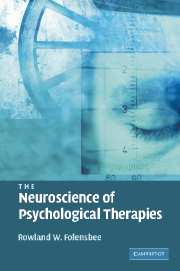Book contents
- Frontmatter
- Contents
- Acknowledgements
- 1 Introduction
- Part 1 Basic concepts
- Part 2 The process of psychotherapy
- 10 Introduction to neuroscience applications in psychotherapy
- 11 Intake and assessment
- 12 Neural networks in therapy
- 13 Affect in therapy
- 14 Memory and change
- 15 Anxiety and change
- 16 The experience of improvement in psychotherapy
- 17 The therapist's neuroscience
- 18 Communicating with clients through neuroscience
- 19 Integrating traditional therapies
- 20 Applying neuroscience to depression intervention
- 21 Neuroscience and psychotherapy: moving forward
- Appendix: Neuroimaging and psychological therapies
- References
- Index
14 - Memory and change
Published online by Cambridge University Press: 15 December 2009
- Frontmatter
- Contents
- Acknowledgements
- 1 Introduction
- Part 1 Basic concepts
- Part 2 The process of psychotherapy
- 10 Introduction to neuroscience applications in psychotherapy
- 11 Intake and assessment
- 12 Neural networks in therapy
- 13 Affect in therapy
- 14 Memory and change
- 15 Anxiety and change
- 16 The experience of improvement in psychotherapy
- 17 The therapist's neuroscience
- 18 Communicating with clients through neuroscience
- 19 Integrating traditional therapies
- 20 Applying neuroscience to depression intervention
- 21 Neuroscience and psychotherapy: moving forward
- Appendix: Neuroimaging and psychological therapies
- References
- Index
Summary
Many of the descriptions offered here regarding concepts related to neural networks and processing affect have included references to implicit and explicit memory processes. It is helpful to directly consider the implications of various aspects of memory during the process of therapeutic change.
Implicit memories are conceived as being based on simple connections between different neurons throughout the brain. The connections are strengthened slowly by multiple repetitions of connected neurons firing simultaneously (Kandel et al., 2000b, pp. 1254–7). They weaken slowly through lack of simultaneous firing (Johnston, 2004; Kandel et al., 2000b; Purves & Lichtman, 1985). One likely manner of weakening negative affect is through experiencing sensory stimuli while holding affect calm, thereby reducing the previous pairing of sensory (and other) neurons with negative emotions. Relaxation training combined with exposure during progressive desensitization (Wolpe, 1958) is a therapeutic intervention that achieves such a goal. Another likely manner of weakening is by way of habituation (Foa & Chambless, 1978; Kandel et al., 2000b, pp. 1248–52); that is, the neuron pair is pressed, through exposure, to fire so often and for so long that neurotransmitters in the relevant synapses are temporarily used up, allowing the sensory (and other) neurons to fire without including simultaneous firing of affect neurons. Exposure with response prevention (Foa et al., 1984) is an example of a psychotherapeutic intervention that achieves such a weakening. It should be noted that psychodynamic focus on issues could operate through the same mechanisms.
- Type
- Chapter
- Information
- The Neuroscience of Psychological Therapies , pp. 117 - 128Publisher: Cambridge University PressPrint publication year: 2007



